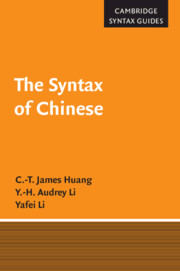1 - Categories
Published online by Cambridge University Press: 05 June 2012
Summary
We take it as our starting point that a Chinese sentence is composed of words and that words have different behaviors in a sentence. For instance, while dayan fei ‘wild.goose fly’ is an acceptable sentence, *fei dayan ‘fly wild.goose’ is not. The most obvious reason for the contrast is that dayan ‘wild.goose’ is a noun that canonically serves as the subject of the sentence and fei ‘fly’ is a verb whose canonical function is to be the predicate occurring after the subject. This means that in order to understand the syntax of Chinese, or the syntax of any language for that matter, we minimally need to understand how the words in a language are classified and how these different classes of words are put together to form sentences. In this book, word classes are referred to as lexical categories, or just categories for short, following the terminological convention of generative syntax.
While the basic distinction between nouns and verbs is universally recognized in modern literature on Chinese syntax, scholars differ, sometimes drastically, on other categories. See Chao (1968), Li and Thompson (1981), Zhu (1982), and Xing and Ma (1992) for a few examples. The differences in opinion arise partly because linguists with different theoretical backgrounds may employ different criteria for word classification, and partly because we still lack sufficient knowledge about certain words and their properties.
- Type
- Chapter
- Information
- The Syntax of Chinese , pp. 9 - 37Publisher: Cambridge University PressPrint publication year: 2009



